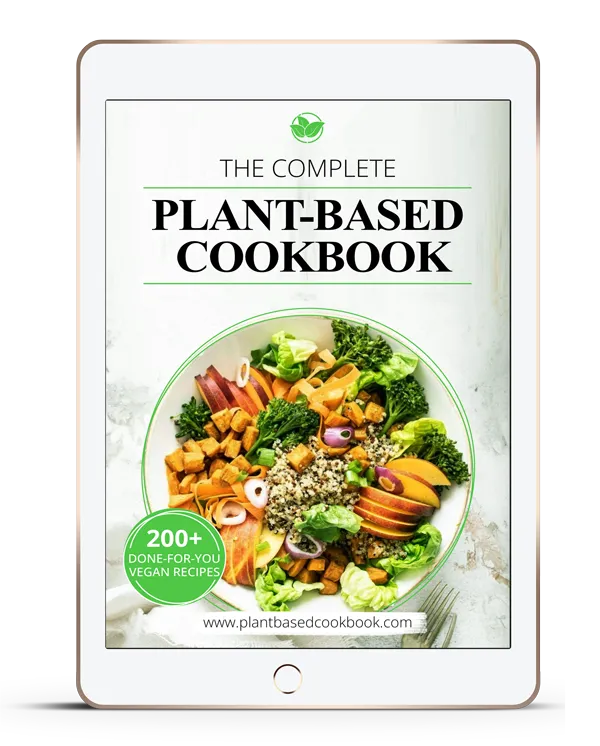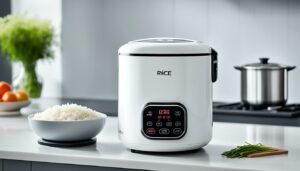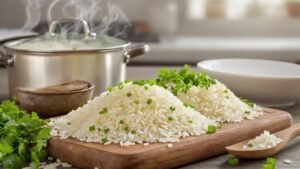Have you ever wondered how to add more flavor to your rice dishes? Whether you are a seasoned cook or just starting in the kitchen, learning how to flavor rice in a rice cooker can take your meals to the next level.
Rice is an essential staple food for many households worldwide and can be enjoyed as a side dish or as part of a main course.
However, plain steamed rice may not always satisfy our taste buds, which is why it’s crucial to explore different ways of adding flavor.
In this article, we will cover various methods for flavoring rice in a rice cooker. From choosing the right type of rice to incorporating spices and herbs, meat and vegetables, we will provide practical tips on how to enhance the taste and aroma of your favorite recipes. We will also share some cooking recipes that are perfect for using with a rice cooker, making meal preparation easy and effortless.
So whether you are looking for new culinary inspiration or simply seeking ways to elevate your existing dishes’ flavors, read on!
Table of Contents
ToggleChoosing the Right Rice for Flavoring
When it comes to flavoring rice in a rice cooker, choosing the right type of rice is crucial. Different types of rice have distinct flavors and textures that can greatly influence the overall taste of your dish. Additionally, it’s essential to follow the correct cooking ratios for each variety of rice to ensure that it cooks properly and absorbs your chosen seasonings evenly.
By selecting the appropriate rice and adhering to the proper cooking methods, you can create flavorful and delicious dishes every time.
Types of Rice
Basmati and Jasmine are two popular varieties of rice known for their aromatic fragrance and distinct taste. Basmati is long-grain rice originating from India and Pakistan, while Jasmine is a fragrant variety hailing from Thailand. Both these types of rice are commonly used in Asian cuisine, especially in dishes such as biryani, pilaf, or curry.

Another factor to consider when choosing the right type of rice to flavor in a rice cooker is whether to use brown or white rice.
Brown rice has more fiber and nutrients than white rice as it retains its bran layer during processing. This makes it a healthier option but also requires longer cooking time compared to white rice.
However, white rice tends to be fluffier and less sticky than brown when cooked in a rice cooker. Understanding the differences between these types of rice can help you choose which one works best for your desired dish or cultural recipe that you plan on preparing with your trusty kitchen appliance.
Cooking Ratios
Optimizing the correct proportion of water to rice is crucial in achieving perfectly cooked grains with ideal texture and moisture retention. There are several factors that determine the amount of water required for cooking rice, such as the type of rice, age of the grain, altitude, and humidity levels. However, a general rule of thumb is to use a 1:2 ratio of rice to water for most types of white and brown rice.
When measuring water for cooking rice in a rice cooker, it’s essential to consider two things: volume measurement and cooking time. Here are four guidelines to help you get started:
- For every cup of uncooked long-grain white or brown rice, use one-and-a-half cups of water.
- For every cup of short-grain sushi or arborio rice, use one-and-a-quarter cups of water.
- If using aged or dry grains, increase the amount of water slightly.
- Adjust cooking time based on your desired level of doneness – longer times will result in softer grains with more moisture while shorter times will yield firmer grains with less moisture retention.
By following these tips and experimenting with different combinations based on your preferences, you’ll be able to find the perfect balance between flavor and texture when preparing your next batch of deliciously flavored rice in a rice cooker.
Adding Spices and Herbs to the Rice
Spices and herbs can be added to the rice in a rice cooker to enhance its flavor without much effort. These ingredients provide a quick and easy way to add variety, depth, and complexity of flavors to any plain rice dish.
Herb combinations such as rosemary and thyme or cilantro and lime can add freshness to your meal, while spice blends like curry powder or garam masala can bring warmth and richness.

To make sure that you get the most out of your spices and herbs, it is important to know how much to use. A good rule of thumb is to use about 1 teaspoon of dried herbs per cup of uncooked rice or about 2 teaspoons of fresh herbs.
When it comes to spices, start with a small amount (about 1/4 teaspoon) and adjust accordingly based on your taste preferences.
Keep in mind that some spices like cumin or paprika have stronger flavors than others like cinnamon or nutmeg.
When adding spices and herbs into the rice cooker, consider layering them throughout the cooking process rather than just dumping them all in at once.
For example, if using fresh herbs like basil or parsley, add them towards the end of cooking so that their delicate flavors are not lost during the longer cooking time. Spices on the other hand can be added at any point during cooking but may become more concentrated towards the end if they are not stirred in well enough initially.
Heres a table showing you which spices work best with which herbs:
| Spice Blends | Herb Combinations |
|---|---|
| Curry Powder | Rosemary & Thyme |
| Garam Masala | Cilantro & Lime |
| Cajun Seasoning | Basil & Parsley |
| Chinese Five-Spice | Sage & Garlic |
By incorporating different spice blends and herb combinations into your rice dishes, you can create unique flavor profiles that will keep things interesting at mealtime.
Incorporating Meat and Vegetables into the Rice
Incorporating meat and vegetables into rice cooked in a rice cooker can add more depth to the dish.
Meat variations such as chicken, beef, pork, or seafood can be added to the rice cooker along with the rice for a one-pot meal. Adding meat not only enhances the flavor but also increases the protein content of the dish making it more satisfying and filling.
Vegetables can also be incorporated into the rice cooker to add nutrition and color to the dish. Some popular vegetable pairings include peas, carrots, onions, bell peppers, and mushrooms.
These vegetables not only add texture and variety but also provide essential vitamins and minerals. By adding these healthy ingredients to your rice dish in a rice cooker you are providing yourself with a balanced meal that is both tasty and nutritious.
By incorporating meat variations and vegetable pairings into your rice in a rice cooker you can create endless possibilities for different meals.
The addition of meat provides protein while vegetables offer important nutrients like fiber which keeps you feeling full longer. Experimenting with different combinations will allow you to discover new flavors that will make your taste buds happy without compromising on nutritional value.
So go ahead, and try out some new combinations today!
Cooking Recipes with a Rice Cooker
One of the advantages of owning a rice cooker is its versatility in preparing various types of dishes. Apart from traditional rice recipes, a rice cooker can also be used to create one-pot meals with meat and vegetables. With a little creativity and some helpful hacks, you can make delicious and healthy food without spending too much time in the kitchen.
- Micro computerized fuzzy logic technology. Capacity Up to 5.5 cups / 1.0 liter,Dimensions (W x D x H) 10-1/8 x 14 x 8-1/2 inches. The electrical rating is 120 volts / 610 watts
- Automatic keep warm, extended keep warm and reheating cycle
- Easy to clean clear coated stainless steel exterior, 2 delay time settings
- Interchangeable melody and beep signal
- Built in retractable power cord
One way to add flavor to your rice is by using broth or stock instead of plain water. This technique will infuse your grains with savory flavors that complement any dish you prepare. Additionally, you can experiment with different herbs and spices such as garlic, ginger, turmeric, cumin, and paprika to give your rice dishes an extra punch.
Another unique idea for cooking with a rice cooker is making breakfast oatmeal.
You can use steel-cut oats or rolled oats along with milk or water to make creamy oatmeal that’s ready when you wake up in the morning. Add some fruits like bananas or berries for added nutrition and sweetness.
The best part?
You don’t need to worry about stirring or burning it because the rice cooker does all the work for you.
Owning a rice cooker opens up many possibilities for creative meal ideas beyond just basic white rice dishes. By incorporating broth or spices into your grains and experimenting with alternative ingredients like oatmeal, you can enjoy healthy meals without sacrificing taste or convenience. Rice cookers are not only practical but also offer endless opportunities for mealtime fun!
Conclusion
When it comes to adding flavor to rice, a rice cooker can be a useful tool. Choosing the right type of rice, such as jasmine or basmati, can make a difference in the final taste. Adding spices and herbs like cumin or cilantro can give your rice a unique twist. Incorporating meat and vegetables into the mix can also elevate the dish.
Cooking with a rice cooker allows for easy preparation of flavorful dishes without much effort. With its automated cooking process, you can simply add ingredients and let the machine do its job – leaving you with more time to enjoy your meal. Whether you’re looking for an exotic twist on traditional white rice or want to experiment with different flavors, using a rice cooker is an excellent way to achieve delicious results.
Imagining fluffy grains of fragrant jasmine rice mingling with aromatic spices and tender pieces of juicy meat is enough to make anyone’s mouth water. By following these tips for flavoring your rice in a rice cooker, you’ll be able to create savory dishes that are sure to impress your family and friends. So why not use this versatile kitchen appliance and start experimenting today?
You never know what delicious creations you might come up with!
Last update on 2025-09-26 / Affiliate links / Images from Amazon Product Advertising API







